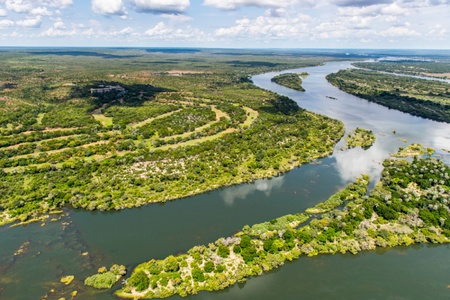A multi-million-pound research project to explore the promotion of an integrated and adaptive water resources management system in the Zambezi River Basin (ZRB) and the Omo-Turkana Basin (OTB) has recently been concluded.
Researchers from the University of Aberdeen Law School were involved in the Horizon 2020 project which comprised a consortium of fourteen European and African regional partners. The project aimed to examine and understand the Water-Energy-Food (WEF) Nexus within the two critical river basins by using a participatory approach with key local stakeholders, working towards the creation of a Decision-Analytical-Framework (DAF) to enhance future decision making.
The Aberdeen team, comprised of Professor Zeray Yihdego and Julie Gibson, were responsible for the governance component of the project. The team conducted an extensive review of legal and policy frameworks at multiple levels: national, basin, regional and international, across both basins, to explore how the resources are currently governed.
Research was conducted on the extent to which the key principles of International Water Law (including equitable and reasonable use, no significant harm and the duty to cooperate) are used within the basins and information provided relating to how each principle could be used to enhance basin governance. It also looked at how these principles are presented within national policies and development plans.
These principles were also linked to Water Energy Food Nexus (WEF) and the UN Sustainable Development Goals, illustrating how using key principles through the lens of multiple sectors and developing linkages to key policy agendas can give greater ‘substance’ and clarity to legal provisions.
The team’s research served to illustrate the legal, policy and institutional gaps which exist within the two basins and provide key recommendations for future cooperative pathways. The research conducted with relation to the ZRB has already been published in the Brill Research Perspectives in International Water Law, and publications with relation to the OTB are forthcoming.
Professor Yihdego said: “The integration of key legal and policy frameworks including international water law principles, the WEF Nexus and the Sustainable Development Goals, could streamline existing efforts and further implementation.
“Our research also suggests that benefit-sharing which extends beyond the energy sector could enhance regional integration and improve sustainable development within both basins.”
For further information please contact Professor Zeray Yihdego or Julie Gibson.



